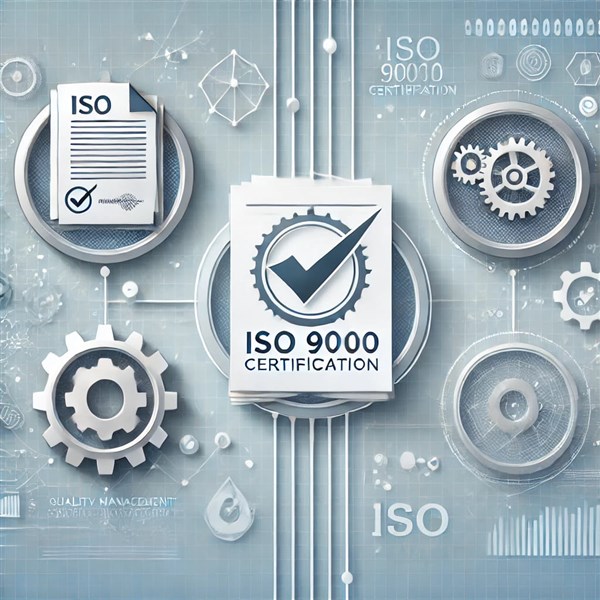
In today's competitive business landscape, organizations continually seek ways to improve their processes, enhance customer satisfaction, and boost operational efficiency. One effective way to achieve these goals is through ISO 9001 certification. ISO 9001 is a globally recognized standard for quality management systems (QMS) that provides a framework for organizations to ensure consistent quality in their products and services. This article will delve into the numerous benefits of obtaining ISO 9001 certification and how it can significantly enhance an organization's quality management practices.
What is ISO 9001 Certification?
ISO 9001 certification is part of the ISO 9000 family of standards developed by the International Organization for Standardization (ISO). It outlines the criteria for establishing a quality management system, focusing on customer satisfaction and continuous improvement. ISO 9001 applies to organizations of all sizes and industries, from manufacturing and services to non-profit and government sectors.
To achieve ISO 9001 certification, an organization must demonstrate its ability to consistently provide products and services that meet customer and regulatory requirements. This involves developing, implementing, and maintaining a QMS that aligns with ISO 9001 standards. An independent third-party auditor assesses the organization's QMS to ensure compliance, leading to certification if all criteria are met.
Benefits of ISO 9001 Certification
1. Enhanced Customer Satisfaction
One of the primary benefits of ISO 9001 certification is improved customer satisfaction. The standard emphasizes understanding customer needs and expectations, leading organizations to implement processes that ensure product and service quality. By consistently meeting or exceeding customer expectations, certified organizations can enhance customer loyalty, leading to repeat business and positive word-of-mouth referrals.
2. Increased Operational Efficiency
ISO 9001 requires organizations to establish clear processes and procedures for their operations. By documenting these processes and implementing standardized practices, businesses can minimize inefficiencies and reduce waste. A streamlined operation not only enhances productivity but also contributes to cost savings, allowing organizations to allocate resources more effectively.
3. Continuous Improvement
ISO 9001 certification fosters a culture of continuous improvement within organizations. The standard encourages businesses to regularly review their processes and performance metrics, identify areas for enhancement, and implement corrective actions. This ongoing evaluation ensures that organizations remain agile and responsive to changing market conditions and customer needs.
4. Better Employee Engagement and Satisfaction
A well-implemented QMS promotes employee involvement and engagement. ISO 9001 encourages organizations to empower their employees by involving them in decision-making processes, fostering collaboration, and providing opportunities for training and development. Engaged employees are more likely to take ownership of their work, leading to increased job satisfaction and higher productivity.
5. Competitive Advantage
In an increasingly competitive marketplace, ISO 9001 certification can differentiate an organization from its competitors. Many customers and clients prefer to work with certified companies, as it demonstrates a commitment to quality and reliability. Having ISO 9001 certification can enhance an organization’s reputation, making it more attractive to potential clients and partners.
6. Access to New Markets
ISO 9001 certification can open doors to new business opportunities, particularly in sectors where quality assurance is critical. Many industries, such as aerospace, automotive, and healthcare, require their suppliers to hold ISO 9001 certification. By obtaining this certification, organizations can expand their reach and access markets that may have been previously unavailable.
7. Improved Risk Management
ISO 9001 emphasizes risk-based thinking, encouraging organizations to identify and mitigate potential risks to quality. By adopting a proactive approach to risk management, organizations can prevent issues before they arise, leading to fewer disruptions and a more stable operational environment. This focus on risk management can enhance an organization's resilience and adaptability in the face of challenges.
8. Compliance with Regulatory Requirements
For many organizations, ISO 9001 certification helps ensure compliance with various regulatory and legal requirements. The standard provides a framework for organizations to document their processes and maintain records, making it easier to demonstrate compliance during audits and inspections. This can be particularly beneficial in highly regulated industries, where non-compliance can result in significant penalties.
9. Enhanced Supplier Relationships
ISO 9001 encourages organizations to establish clear criteria for selecting and evaluating suppliers. By implementing a standardized approach to supplier management, organizations can ensure that they work with reliable partners who meet their quality standards. This can lead to stronger supplier relationships, improved communication, and a more consistent supply chain.
10. Better Decision-Making
ISO 9001 promotes data-driven decision-making, encouraging organizations to collect and analyze performance data. By using data to inform decisions, organizations can identify trends, measure the effectiveness of their processes, and make informed choices that drive improvement. This analytical approach leads to more effective strategies and better overall outcomes.
Conclusion
ISO 9001 certification is not just a stamp of approval; it is a powerful tool for organizations seeking to enhance their quality management practices. By focusing on customer satisfaction, operational efficiency, and continuous improvement, certified organizations can enjoy numerous benefits that contribute to their overall success. From increased customer loyalty and employee engagement to improved risk management and compliance, the advantages of ISO 9001 certification are far-reaching and impactful.
In an era where quality is paramount, obtaining ISO 9001 certification is a strategic investment that can set an organization apart from its competitors. Whether you are a small business or a large corporation, embracing the principles of ISO 9001 can lead to lasting improvements and a brighter future in the ever-evolving marketplace. If you haven’t already considered pursuing ISO 9001 certification, now is the time to explore the possibilities and reap the rewards it can bring to your organization.
Koenig Solutions is a leading IT training company offering a comprehensive range of certifications in top technology courses, including ISO 9001 Certification. With Koenig, you can rest assured that you're being trained by the best in the business.
Our experienced instructors provide in-depth knowledge and practical skills, ensuring you are well-prepared for the certification examination. Our training courses are designed to meet the needs of every learner, offering flexible schedules and multiple learning modes.
Invest in your company's future by enhancing your quality management system with ISO 9001 Certification. Contact Koenig Solutions today to learn more about our training courses.







COMMENT